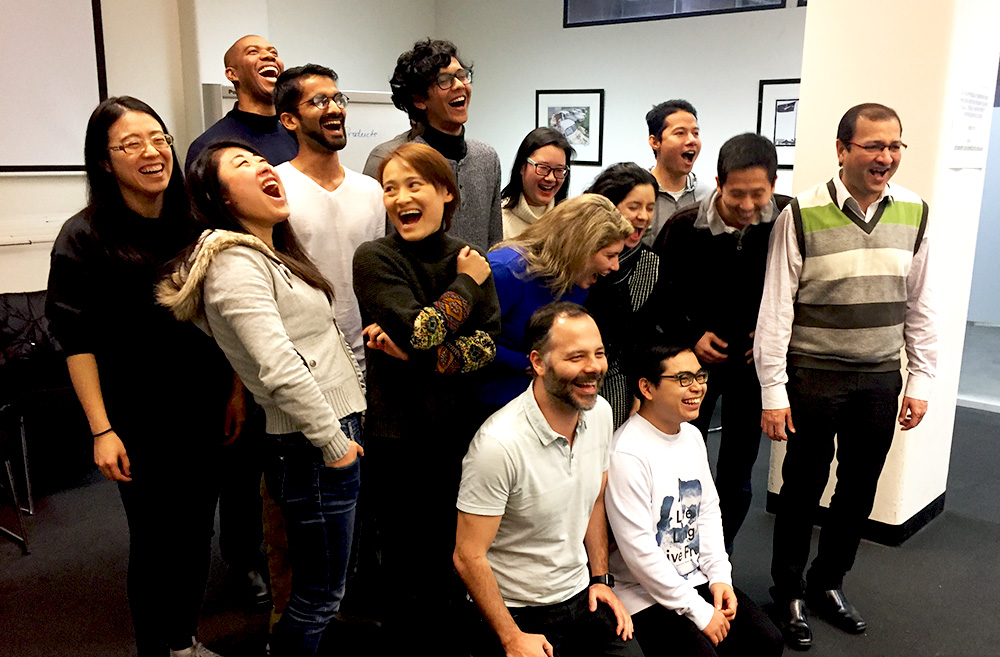Putting into words what life is really like for some overseas students can be difficult — language and cultural barriers may get in the way of fully expressing a student’s successes, turmoil, or frustrations. But there are other ways of verbalising these experiences.
For 18 weeks, the Act of Translation workshops — a project co-organised by Study Melbourne, City of Melbourne, RMIT University and the Australian Federation of International Students — has drawn on theatre and performance to help international students communicate their experiences in a fun and creative forum. The project brought together international students from countries such as China, Iraq, India, Indonesia, Pakistan, Vietnam, Brazil and Colombia and was led by artistic director, Catherine Simmonds.
“[The] creative workshops are there to inspire [international students’] confidence to be who they are, to tell the story of who they are and how they want to tell it,” said Simmonds.
These workshops culminated in a live performance on August 26, 2017, which debuted during the Melbourne Writers’ Festival.
“It’s not about grammatically perfect English, that’s not the point. It’s more deeply about self-confidence — it’s about the ability to express yourself beyond the theory of judgement,” Simmonds further emphasised.
Finding your story and voice as a performer

Leading the Act of Translation workshops is Catherine Simmonds who has had vast experience working in creative spaces with communities. | Photo: Wing Kuang
For many years, Simmonds has worked with various universities and organisations to help marginalised groups, including international students, actualise their thoughts and experiences into art. In 2013, she directed Life’s a Gamble, a performance show starring international students which explored issues of gambling that affected members of the international student community. Her focus with this year’s project was to translate the daily life and confusion of the average international student in Melbourne.
At workshops, Simmonds’ first job would be to determine what students want to express. She would ask a series of questions to students to get them thinking, allowing students to be more comfortable when opening up.
“Things we have explored are the struggle — so I asked everybody in the group, ‘What’s the issue you would express?”. For example, language barriers and cultural barriers; since they are mentioned, [I’d ask] ‘What on earth are these terms’, ‘What are the specific issues relating to them?’, ‘What could be the location, time and subject?’, ‘What could be the possible interaction among the people in the story?’ [or] ‘What was told and what should have been told?’,” she told Meld.
Once students come up with ideas through open discussions, both with Simmonds and their peers, Simmonds would ask them to translate their language into actions. These have included performing stories based on their initial experiences in Melbourne, their first IELTS tests, and even when they first encountered Australian idioms.
On the importance of art and expression, Simmonds says that creativity does not discriminate.
“[It] doesn’t matter what country or culture you are from, it’s the experience of somebody being in the same room [at the] same time [and] what can you perceive from other people,” she said.
“I think as a country with so many international students, we have to work harder to explore the intercultural space; people from different spaces with new sense of selves. And that takes creativity because there’s no one way to approach it,” Simmonds added.
Student perspectives

Student performers rehearsing for She’ll be right, the theatre production that the Act of Translation workshops have built towards. | Photo: Wing Kuang
For the students participating in these workshops, the experience has been a unique one.
“At first, I thought the workshop was about language and translation,” said Jing Jiang, a Master of Translation and Interpreting student from China.
“But then I realised the workshop was about another [kind of translation] — a translation of people’s behaviour, and it is in the form of acting,” Jing further elaborated.
University of Melbourne student, Ujashkuma Patel, has valued the experience with Simmonds and his peers. The computer science student said the workshops offered him an opportunity to explore the creative arts and build confidence. He has planned to attend more acting classes when the workshop series comes to an end.
“I’m always waiting for Wednesday, so that I could come and meet everybody here. I try to explore my identity, try to make friends with confidence, and I can share and express, and try to understand things about life. Everybody [here] is in the same position and have the same difficulty and value,” Patel said.
Where you can see their work
While these students have already debuted their performance and experienced live jitters for the first time, the journey continues and more opportunities to perform have already been planned.
The Act of Translation’s student actors will take the stage once again on October 24. Their show, titled She’ll be right, will take place at Library at the Dock (107 Victoria Harbour Promenade, Docklands) and is a FREE performance presented to you by Study Melbourne, City of Melbourne, RMIT University and the Australian Federation of International Students. To book your attendance, visit the show’s official Eventbrite page and register.
Can’t make it to the first show on October 24? Subsequent performances will take place on Friday, October 27 at RMIT University and Saturday, October 28 at the Immigration Museum.
Act of Translation and Be You Be Scene has since been completed. But keep up with Be You Be Scene’s Facebook and Instagram or contact Feifei at Feifei.liao.bybs@gmail.com to ask about their next project.


a very meaningful project!!! I am gonna to have a look~